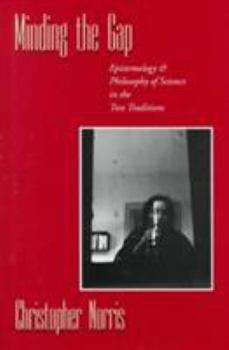Minding the Gap: Epistemology and Philosophy of Science in the Two Traditions
In this sweeping volume, Christopher Norris challenges the view that there is no room for productive engagement between mainstream analytic philosophers and thinkers in the post-Kantian continental line of descent. On the contrary, he argues, this view is simply the product of a limiting perspective that accompanied the rise of logical positivism. Norris reveals the various shared concerns that have often been obscured by parochial interests or the desire to stake out separate philosophical territory. He examines the problems that emerged within the analytic tradition as a result of its turn against Husserlian phenomenology and its outright rejection of what came to be seen as a merely "psychologistic" approach to issues of meaning, knowledge, and truth. Norris shows how these problems have resurfaced in various forms from the heyday of logical empiricism to the present. He provides critical readings of such philosophers as Willard Quine, Thomas Kuhn, Donald Davidson, Hilary Putnam, Richard Rorty, Michael Dummett, Thomas Nagel, and John McDowell. He also offers a running discussion of Wittgenstein's influence and its harmful effect in promoting a placidly consensus-based theory of knowledge. On the continental side, Norris argues for a reassessment of Husserl's phenomenological project and its potential contribution to present day Anglo-American debates in epistemology and philosophy of science. He discusses Bachelard, Canguilhem, and the French tradition of rationalisme appliqu as an alternative to Kuhnian conceptions of scientific paradigm change. This leads him to suggest a non-Wittgensteinian way around the problems that have dogged more traditional theories of knowledge and truth. In two chapters on the work of Jacques Derrida, Norris explores the "supplementary" logic of deconstruction and compares it with other recent proposals for a nonstandard logic. Here again he stresses the community of interests between the two philosophical cultures and the extent to which continental thinking has engaged certain issues with a rigor largely ignored by Anglophone writers. By bringing a fresh perspective to questions that have often been considered the exclusive preserve of analytic philosophy, Norris offers an overview of current debates that is at once refreshingly open-minded and sure of its own argumentative bearings.
Format:Hardcover
Language:English
ISBN:1558492550
ISBN13:9781558492554
Release Date:July 2000
Publisher:University of Massachusetts Press
Length:368 Pages
Weight:1.55 lbs.
Dimensions:1.2" x 6.5" x 9.6"
Customer Reviews
1 rating
The Two Traditions
Published by Thriftbooks.com User , 14 years ago
While not an introductory text, Norris has produced a book that looks into the contentious gap between the two dominate traditions and manages to maintains a steady conciliatory stance. Whether he is discussing deviant logics, interpretations of quantum mechanics, naturalism, the history of philosophy, deconstruction or the hermeneutic circle we always feel that we are in rigorous and competent hands. Husserl's neglect by analytic philosophers of science is bemoaned as is the numerous shallow readings of Derrida. He looks at the limits of naturalism along with the view of philosophy as a genre of writing. Wittgenstein's is seen as more toward the center of the so-called divide and the Searle-Derrida fiasco is reviewed as unfortunate. This is a philosophy book and is thus heavy on theory. However, with some background you will not be swimming in a sea of muck. It may not change your life drastically, but the book is a pleasant surprise. Then again, those really into it probably will not want to read a book that is 10 years old. Recommended.






